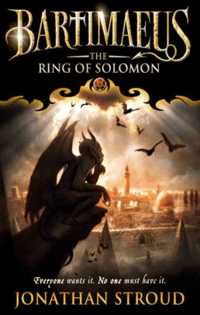Bartimaeus Sequence
| Author | Jonathan Stroud |
|---|---|
| Country | United Kingdom |
| Language | English |
| Genre | Fantasy |
| Publisher | Random House |
| Published | 30 September 2003 – 14 October 2010 |
The Bartimaeus Sequence[1] is a fantasy series by Jonathan Stroud consisting of a trilogy published from 2003 to 2005 and a prequel novel published in 2010. The eponymous character, Bartimaeus, is a five-thousand-year-old djinni, a spirit of approximately mid-level power. The story follows the career of a teenage magician Nathaniel and the alternative history of the peak of London's domination as a magical oligarchy.
Bartimaeus trilogy
- The Amulet of Samarkand (2003)
- The Golem's Eye (2004)
- Ptolemy's Gate (2005)
Setting
The novels are set in London in an alternate history, though many countries, cities, events and people are from actual history (such as Prague, Solomon, the Holy Roman Empire, William Ewart Gladstone, Benjamin Disraeli, the American Revolution, etc.). The books presume the idea that magic, magicians and demons have been active throughout history, radically altering it. In particular these changes are reflected in the contrast between modern aspects (such as electricity and cars) and older ones (colonial-era weapons including muskets). The current time is never directly stated. The books incorporate references to various world mythologies and folklore, such as the Arabian Nights and Homer.
In the alternate history existing in the story, a type of oligarchy exists, where the people are mainly of two classes. The British monarchy is mentioned in passing, but is said to have been overthrown long before the events of the book.
The magicians are the governing class and hold all important posts in the government, from a Prime Minister down through assorted other ministers. They are humans, no more magical than other human beings. For example, their ability to see demons is the result of wearing special contact lenses. They perform their magic indirectly by summoning, binding, and controlling various types of spirits from the Other Place and by creating magical artifacts.
The commoners are those who are ignorant of magic and who make up the rest of society. They are kept in line by the governing class through fear and ignorance. The commoners are fully aware of the magical world and know of the magicians' dominance. Increasingly during the time period of these stories, some commoners are born with a resistance to magic, or a sensitivity to its presence, or with the ability to see demons naturally.
The books blend 20th-century England with past epochs. London in the trilogy still has the Crystal Palace, where the climax occurs. Because it is stated that the trilogy occurs over a hundred years after the death of William Gladstone in 1898, it is clearly past 1936, when the real Crystal Palace was destroyed by fire. Aeroplanes and e-mail are mentioned, so it can be assumed to be set in more modern times. The Tower of London is still used as a prison. A chandelier in the first book is said to be made of "crystal taken from the ruins of Versailles" and it is implied that France, Germany, as well as Italy obey Britain. Britain's main rival is the Czech Empire (inheritor to the Habsburgs), which has been greatly weakened but still resents Britain.
In the third book, the war against the "American colonies" is a main cause of the commoners' dissent. Apparently, Britain still retains dominion in North America and is sending troops there to suppress discontent. It is also implied that only the New England colonies have large cities, the rest of North America being still under the control of Native Americans.
The Other Place
The Other Place is the habitation of the spirits, where time does not exist and where spirits have no distinct identities, but are merely a single consciousness. The demons' essences are allowed to mingle freely and the laws of time and space are of no concern. There is no order in this world, because there is no matter: only infinite swirling colours and flashes of memories which are shared by all spirits there, due to their lack of identity. In the Other Place, the essence of the demons can heal and replenish itself (since dwelling in the human world is exhausting to spirits). The only (non-demon) visitors to the Other Place have been Ptolemy (using a focusing reversal while summoning) and Kitty Jones. Other magicians have tried but little is known of their attempts. The Other Place is where Bartimaeus, one of the main protagonists and a fourth level djinni, dwells when he is not enslaved by a magician.
Principal characters
- Nathaniel
- Bartimaeus
Plot summary
As the books progress, three story arcs become evident. The largest and overarching plot line is the rise and fall of London as a global authority. The second and third are more personal: the boy changing from the pitiful, yet noble, Nathaniel, to the power-hungry, arrogant John Mandrake and finally earning back his humility and nobility; and the third, involving Kitty and Bartimaeus. In the third story arc, Kitty proves her faith to Bartimaeus by doing something only one non-demon had ever done (Ptolemy) when she went to the Other Place. John Mandrake (Nathaniel) also shows unusual courage and loyalty as he dismisses Bartimaeus, when surely they were going to die, eventually saving the life of a demon. They end up restoring each other's faith in their races. In a Bartimaeus trilogy forum, Jonathan Stroud has remarked that he was planning to make a Bartimaeus "bible". In fact, the main characters' names were brought from the Bible. The biblical Bartimaeus was a man whom Jesus cured from his blindness. Nathaniel, John and Ptolemy were named after the story of Bartholomew the Apostle.
The Amulet of Samarkand

The first book in the series, published 2003, introduces Nathaniel as the gifted 12-year old apprentice of a middle-aged mid-level magician, Arthur Underwood. He assumes a magician name John Mandrake to protect him from rivals who would wish to harm him. When the magician Simon Lovelace cruelly humiliates Nathaniel in public, Nathaniel decides to take revenge by stealing Lovelace's most powerful possession, the Amulet of Samarkand. Unknown to his tutor, he begins the study of advanced magic in order to summon the djinni Bartimaeus and enslave him. There are five basic levels of spirits; in order of increasing strength they are: imps, foliots, djinni, afrits and marids. Above these levels exist even more powerful entities, who are rarely summoned. Human magicians use spells to compel these spirits to perform feats of power. Bartimaeus soon overhears Nathaniel's birth-name, which greatly reduces Nathaniel's control over him, because demons can then cast counterspells. Things soon get out of hand and Bartimaeus and Nathaniel find themselves caught in the middle of magical espionage, murder, blackmail, and revolt. Together, the two of them defeat Lovelace and his most powerful demon, Ramuthra, who was last seen destroying an entire nation. These actions ended an uneasy truce between the young magician and Bartimaeus, resulting in the demon returning to whence he came.
The Golem's Eye

Published in 2004, the second book picks up two years and eight months later and features Nathaniel as a junior magician working his way up the government ranks. In this book Kitty Jones is introduced as an important character. She is a part of the Resistance movement which seeks to end the oppressive rule of the magicians. Nathaniel is tasked by his superiors to crush the Resistance and capture the members. His task is complicated when a seemingly invulnerable clay golem starts to make random attacks on London. Much to the displeasure of Bartimaeus, Nathaniel recalls the djinni to aid him in uncovering the origins of the golem and to save his own skin.
Ptolemy's Gate

In the final book of the series, published 2005, Nathaniel is a senior magician and despite his extreme youth, a member of the ruling council, an elite class of magicians in the government. Bartimaeus is still trapped on Earth by Nathaniel and is treated with disdain, continuously weakening as he is not allowed to return to the Other Place. Meanwhile, Kitty Jones has been hiding undercover and completing her research on magic and spirits. She hopes that this will enable her to break the endless cycles of conflicts between djinn and humans. The main plot of this story is a conspiracy to overthrow the government which causes the most dangerous threat in the history of magic. Together, Nathaniel, Bartimaeus and Kitty try to save the city of London from this dangerous threat.
Bartimaeus reveals to the reader the presence of an endless cycle wherein magicians summon spirits, magicians rule over commoners, spirits spread magic throughout a city, some of the commoners gain a resistance to magic, the commoners rebel against the magicians, the magicians are overthrown and the spirits return to the Other Place until another magical empire rises to dominance. This cycle proves to be the main plot, which culminates in the overthrowing of London. Bartimaeus makes references to other magical empires, such as Baghdad, Rome and Egypt, all of which have fallen from dominance as well.
Prequel

The Ring of Solomon (2010) revisits the universe created in the Bartimaeus Trilogy, although the setting shifts from modern London to Jerusalem, 950 BC. It follows the djinni's adventures during the reign of King Solomon, who was frequently referenced in the footnotes during the trilogy. It was released in the United Kingdom on 14 October 2010 and in the U.S. on November 2, 2010. The story revolves around the troubles Bartimaeus faces after attending to one of King Solomon's magicians, Ezekiel. Bartimaeus tricks his master into stepping out of his circle. In doing so, the magician breaks all protective barriers and is dealt with by Bartimaeus. Upon hearing this, King Solomon demands that Bartimaeus be brought to justice at the hands of Khaba the Cruel, a truly feared magician who shows no kindness to his servants. Khaba has a loyal Marid servant named Ammet who, alongside Khaba, works to overthrow Solomon and seize control of Jerusalem. Meanwhile Asmira, captain of the guard of Balkis, Queen of Sheba, has been sent by her Queen to assassinate Solomon.
See also
References
- ↑ "About the Series". The Official Bartimaeus Site. Retrieved October 6, 2012.
External links
| ||||||||||||||||||||||
| ||||||||||||||||||